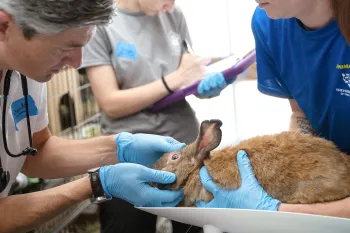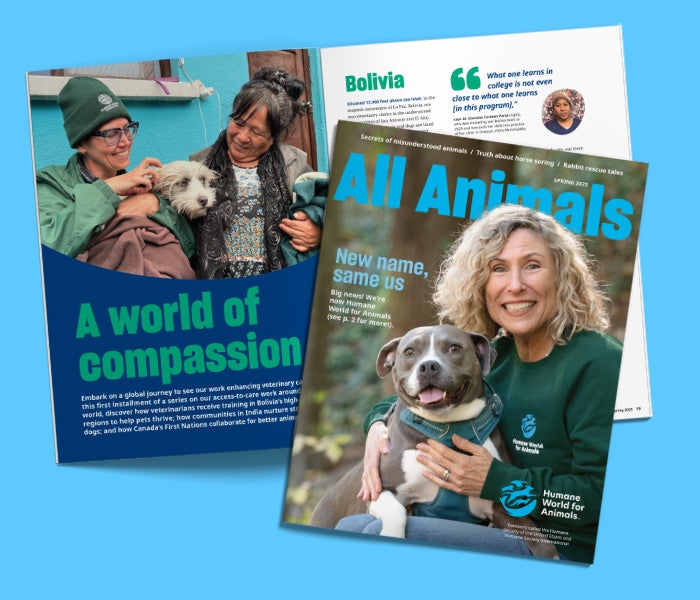Mike was driving through Virginia in the 1990s when he saw a caged rabbit outside a store. The sight struck Mike, who had been struggling with alcohol addiction, profoundly.
“I don’t like seeing an animal in a cage because that’s what alcohol did to me. It put me in a cage and made me a prisoner,” says Mike, who asked to be identified by his first name only. In a spur-of-the-moment decision, he told a store worker he would take the rabbit. He had never owned one before, but he knew he wanted to help this animal.
While driving away with his new companion, Mike’s car broke down. As he waited for assistance to arrive, he noticed a bar down the road and was tempted to drink. “I looked at this big rabbit and I said, ‘Well, I can’t take her in there, and I can’t leave her in the car.’ So I ended up just sitting in the car.”
After help arrived, he and his rabbit were transported to a motel for the night. As he looked at the animal sitting on the bed with him, he remembers thinking, “Holy s---, she kept me sober today.” He also realized he was now responsible for her.
“That sense of responsibility…helped keep me sober,” he says. “That’s how I came to rabbits. She may have very well saved my life that day.” He has now maintained his sobriety for almost two decades and has continued to own rabbits since that first 17-pound French lop.
In recent years, though, it became difficult for Mike to care for his rabbits due to a health crisis. Without the ability to get them spayed and neutered and maintain the elaborate system of gates in his house that separated the rabbits by their sex, the population grew out of control. Concerned loved ones convinced Mike he needed help. A relative reached out to McKamey Animal Center in Chattanooga, Tennessee. The organization then requested our assistance.
In August, members of our rescue team worked with McKamey Animal Center to rescue more than 100 rabbits from the home. Some suffered from flea infestations, hair loss and injuries typical of overcrowding. Multiple nursing litters were found burrowing in furniture, and rabbit droppings had accumulated on the floors of the house.
Although Mike was embarrassed by the state of his home and sad to see his companions leave, he was immensely grateful for help. “The key thing to me with all these guys is to know they are finding good, safe homes,” he says. “That’s all I’ve ever wanted.”
Inga Fricke, executive director of McKamey Animal Center, was on scene during the rescue and remembers being touched by Mike’s story. “You couldn’t interact with him without knowing how much he really loved those animals. …He was incredibly brave to share his story. Not many people would.”
Director of operations for our rescue team, Audra Houghton, was also on the scene. “It’s easy for people to become jaded working in animal welfare, and we often want to blame owners without thinking about the circumstances they’re in,” she says. “However, when people are in crisis, so are their pets, and it’s not possible to truly care about animals without having empathy for their humans.”
Fricke encourages anyone who relates to Mike’s story to ask for help. The worst thing someone can do is put their head down and think they’re alone, she says. “There are people who care and are willing to help.”
After the rescue, the rabbits were housed at a temporary shelter. They then went to McKamey Animal Center and other partners for adoption. McKamey’s staff also made sure Mike had a network of support and a safer place to live.
On the day of the rescue, Mike focused on imagining his rabbits living in new homes where they could make others just as happy as they made him. Right now, the rabbits are doing just that.

